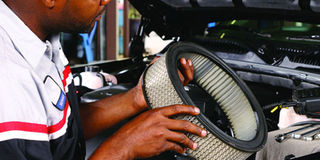Maintaining clean air filters

Air filters need to be changed regularly to maintain the right flow of air into the engine and to protect the engine from debris. Courtesy Photo
What you need to know:
A properly maintained filter system will enhance the performance and extend the life of a car.
You shall always hear car phrases with filter in them for instance oil filter, fuel filter, and air filter.
All filters incorporate a filtering element constructed from various materials. These materials can vary from cloth fibre, paper fibre, wire mesh screens or any combination of the three. Most fuel and oil filters are housed within a metal container connected to the engine or fuel system and are fairly complex to replace so you definitely need a mechanic.
Of all the filters, one that has the least difficulty in checking and replacing or fixing is the air filter. You may not have put much thought into your car’s air filter just because it seems like such a simple aspect of the car’s maintenance. Actually, air filters can make a tremendous difference in the life and general performance of any engine.
When to check
But how do you know when to check or change your air filter? The recommended interval for change is every 12,000-20,000 kilometres, but that can be affected by the particular road and air conditions in which you drive.
If you do a lot of driving on dirt or gravel roads, then your air filter is going to clog up much faster than an air filter in a vehicle that is used strictly for city driving. The only real way to know if you need to replace your air filter is take it out and give it a quick inspection. The best way to remember to check your air filter is to check it every other time you change the oil or take the car in for service. Simply ask any mechanic at a station for assistance. Fortunately, many mechanic’s routine includes checking the air filter.
Effects of dirty filter
This air filter toiling away in darkness is often ignored when performing regular maintenance. That is unfortunate, because a clogged air filter can have negative consequences. In the short term, the additional restriction can dramatically decrease fuel economy and increase emissions leading to the engine check light. Should the filter pass dirt through to the delicate inner workings of the engine, severe damage can occur.
In addition, with today’s sophisticated computer-controlled fuel-injection systems, a clean air filter is absolutely necessary to maintain the delicate balance of the air-to-fuel ratio in a fuel injection system.
A dirty air filter causes this system to go haywire trying to maintain that balance.
Interestingly, a slightly dirty air filter works better than a totally clean one. This is because the debris in the filter becomes part of the filtering process, trapping smaller particles that might have otherwise slipped past.
There is no real science to knowing when it is time to replace the filter. If it is dirty, then it obviously needs to be changed. Otherwise, go with your gut feeling. Plan on performing or insisting on this check every few services, and you shall be well ahead of most car owners.




